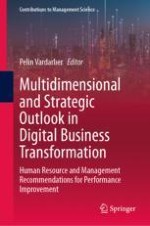2023 | OriginalPaper | Buchkapitel
5. The Validity and Reliability of the Measure for Digital Leadership: Turkish Form
verfasst von : Elif Bilginoğlu, Uğur Yozgat
Erschienen in: Multidimensional and Strategic Outlook in Digital Business Transformation
Aktivieren Sie unsere intelligente Suche, um passende Fachinhalte oder Patente zu finden.
Wählen Sie Textabschnitte aus um mit Künstlicher Intelligenz passenden Patente zu finden. powered by
Markieren Sie Textabschnitte, um KI-gestützt weitere passende Inhalte zu finden. powered by
